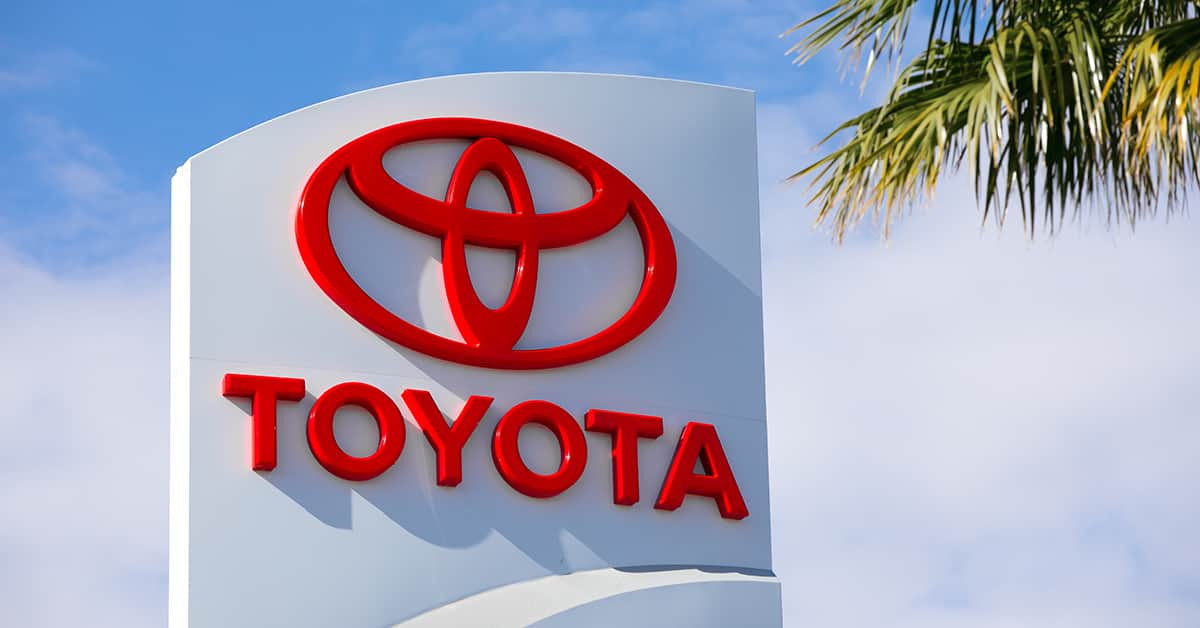How Much Debt Does Toyota Have, and how does this affect consumers in Boise, Idaho? Understanding Toyota’s financial standing can help you make informed decisions when buying or servicing your vehicle at millertoyota.net. We’ll explore Toyota’s debt, its implications, and how Miller Toyota in Boise, Idaho, provides exceptional service and value.
1. Understanding Toyota’s Debt: The Big Picture
Toyota Motor Corporation, a global automotive leader, sometimes carries significant debt due to its massive investments in research and development, global operations, and marketing. But how much debt does Toyota have exactly? Understanding this figure in context is crucial.
Toyota’s Debt in Perspective
While Toyota’s debt can exceed $200 billion, it’s essential to consider this figure relative to its revenue and assets. In 2022, Toyota retained its title as the world’s top-selling automaker, selling 10.5 million vehicles, as noted by Global Finance Magazine. The company’s revenue for that year was $271 billion. Toyota’s debt is a strategic financial decision to maintain its competitive edge.
How Debt Fuels Innovation and Growth
Toyota utilizes debt to invest in innovative technologies, expand its global footprint, and enhance its manufacturing processes. These investments translate to better vehicles, advanced features, and improved customer experiences, benefitting consumers in Boise and beyond.
Key Factors Influencing Toyota’s Debt
- Research and Development: Toyota invests heavily in developing new technologies, including electric vehicles (EVs) and autonomous driving systems.
- Global Operations: Maintaining manufacturing plants and sales networks worldwide requires substantial capital.
- Marketing and Advertising: Promoting the Toyota brand and its vehicles globally involves significant expenditures.
2. Toyota’s Debt Rating: What the Experts Say
Credit rating agencies like S&P, Moody’s, and Fitch provide ratings that reflect Toyota’s ability to repay its debt. These ratings are crucial indicators of the company’s financial health.
High Credit Ratings: A Sign of Stability
Toyota consistently receives high credit ratings from major agencies. These ratings indicate that Toyota is a reliable and financially stable company, capable of managing its debt obligations.
Why Credit Ratings Matter to You
A strong credit rating ensures Toyota’s ability to continue producing high-quality vehicles, providing reliable warranties, and offering excellent customer service. This stability benefits Toyota owners in Boise.
Toyota’s Debt Ratings
| Rating Agency | Rating |
|---|---|
| Moody’s | A1 |
| S&P | A+ |
| Fitch | A+ |
Source: Global Finance Magazine
3. How Toyota Manages Its Debt
Toyota employs strategic financial management to ensure it can comfortably service its debt while continuing to grow and innovate. This includes optimizing its capital structure, maintaining strong cash reserves, and carefully planning its investments.
Debt Management Strategies
- Diversifying Funding Sources: Toyota accesses various funding sources to reduce its reliance on any single lender.
- Optimizing Debt Maturity: Toyota manages its debt maturity schedule to avoid large repayments coming due simultaneously.
- Maintaining Strong Cash Flow: Toyota’s robust sales and efficient operations generate strong cash flow, supporting debt repayment.
Impact on Consumers
Effective debt management allows Toyota to invest in improving its vehicles, enhancing customer service, and providing competitive financing options, all of which benefit consumers.
4. Toyota’s Transition to Electric Vehicles (EVs) and Debt
Toyota is investing heavily in the development and production of EVs. This transition requires significant capital, which can impact the company’s debt levels.
Investing in the Future of Mobility
Toyota plans to sell about 3.5 million EVs by 2030. This ambitious goal requires massive investments in battery technology, manufacturing facilities, and charging infrastructure.
Debt as a Tool for Innovation
Toyota strategically uses debt to fund its EV initiatives, ensuring it remains at the forefront of the automotive industry. These investments will lead to more efficient, environmentally friendly vehicles for consumers.
EV Investment and Debt
Toyota’s investment in electric vehicles is a key driver of its debt. The company needs to develop new technologies, build new factories, and train its workforce to support EV production. These activities require significant capital, which Toyota funds through a combination of debt and equity.
5. Comparing Toyota’s Debt to Other Automakers
It’s important to compare Toyota’s debt to that of its competitors to gain a comprehensive understanding of its financial position.
Debt Levels of Major Automakers
| Automaker | Long-Term Debt (USD Billions) |
|---|---|
| Toyota | 217 |
| Volkswagen | 166 |
| Ford | 139 |
| General Motors | 80 |
Source: Global Finance Magazine, Company Financial Reports
What the Comparison Reveals
While Toyota’s debt is higher than some competitors, its revenue and asset base are also substantial. This comparison highlights the scale of Toyota’s operations and investments.
6. The Benefits of Choosing a Financially Stable Automaker
Opting for a vehicle from a financially stable company like Toyota offers numerous advantages.
Long-Term Reliability
A financially sound automaker is more likely to honor its warranties, provide consistent customer support, and continue producing high-quality vehicles for years to come.
Continued Innovation
Stable companies can invest in research and development, leading to innovative technologies and improved vehicles.
Resale Value
Vehicles from reputable, financially stable brands tend to hold their value better over time.
Benefits for Car Owners
- Warranty Coverage: Toyota’s financial stability ensures that it can honor its warranty obligations, providing peace of mind for car owners.
- Parts Availability: Toyota’s strong financial position allows it to maintain a reliable supply chain, ensuring that replacement parts are readily available when needed.
- Customer Support: Toyota’s financial resources enable it to provide excellent customer support, addressing any issues or concerns that car owners may have.
7. Miller Toyota in Boise, Idaho: Your Trusted Local Dealer
Miller Toyota in Boise, Idaho, provides exceptional service and value to its customers. As a reputable dealer, Miller Toyota offers a wide selection of new and used vehicles, expert service, and reliable financing options.
Why Choose Miller Toyota?
- Extensive Inventory: Miller Toyota offers a wide range of Toyota models to suit every need and budget.
- Expert Service: Miller Toyota’s certified technicians provide top-notch maintenance and repair services.
- Reliable Financing: Miller Toyota offers competitive financing options to help you get behind the wheel of your dream car.
- Customer Satisfaction: Miller Toyota is committed to providing exceptional customer service and ensuring your satisfaction.
Services Offered at Miller Toyota
- New and Used Car Sales: Miller Toyota offers a wide selection of new and used Toyota vehicles, catering to different preferences and budgets.
- Service and Maintenance: Miller Toyota’s service department provides comprehensive maintenance and repair services, ensuring your Toyota runs smoothly.
- Parts and Accessories: Miller Toyota offers genuine Toyota parts and accessories, allowing you to customize and maintain your vehicle.
- Financing Options: Miller Toyota provides various financing options, making it easier for customers to purchase their desired Toyota.
Address: 208 N Maple Grove Rd, Boise, ID 83704, United States
Phone: +1 (208) 376-8888
Website: millertoyota.net
 Toyota Dealership Exterior
Toyota Dealership Exterior
8. How Toyota’s Financial Stability Benefits Boise Customers
Toyota’s financial stability directly benefits customers in Boise, Idaho, in several ways.
Reliable Warranty Service
Toyota’s ability to honor its warranties ensures that Boise customers receive the promised coverage and support for their vehicles.
Consistent Parts Availability
Toyota’s strong supply chain ensures that replacement parts are readily available, minimizing downtime and inconvenience for Boise customers.
Access to the Latest Models and Technology
Toyota’s investments in research and development mean that Boise customers have access to the latest models and innovative technologies.
Benefits for Local Car Buyers
- Strong Resale Value: Toyota vehicles tend to hold their value well, which benefits Boise customers when they decide to trade in or sell their cars.
- Affordable Financing: Toyota’s financial strength allows it to offer competitive financing rates, making it easier for Boise customers to purchase their desired vehicles.
- Community Support: Miller Toyota actively participates in the Boise community, supporting local events and organizations.
9. Real-World Examples of Toyota’s Financial Impact
Consider these real-world examples to understand how Toyota’s financial decisions impact consumers:
Case Study 1: Investing in Fuel Efficiency
Toyota’s commitment to fuel efficiency has resulted in vehicles like the Prius, which saves drivers money at the pump and reduces emissions.
Case Study 2: Developing Advanced Safety Features
Toyota’s investments in safety technology have led to features like Toyota Safety Sense, which helps prevent accidents and protect drivers and passengers.
Case Study 3: Building Reliable Vehicles
Toyota’s focus on quality and reliability results in vehicles that last longer and require fewer repairs, saving owners money over the long term.
Customer Testimonials
“I’ve owned several Toyotas over the years, and they’ve all been incredibly reliable. I appreciate that Toyota invests in building quality vehicles that last.” – John S., Boise, ID
“I recently purchased a new Toyota from Miller Toyota, and the financing process was seamless. I got a great rate, and the staff was very helpful.” – Sarah L., Boise, ID
10. Looking Ahead: Toyota’s Future and Its Impact on Debt
Toyota’s future plans, including its continued investment in EVs and sustainable technologies, will likely impact its debt levels.
Future Growth Strategies
Toyota is focused on expanding its EV lineup, developing autonomous driving systems, and exploring new mobility solutions.
Sustainability Initiatives
Toyota is committed to reducing its environmental impact through sustainable manufacturing practices and the development of eco-friendly vehicles.
How These Initiatives Affect Debt
These initiatives will require significant investments, which may increase Toyota’s debt in the short term. However, these investments are expected to drive long-term growth and profitability, ultimately strengthening Toyota’s financial position.
Commitment to Innovation
- Electric Vehicle Development: Toyota is investing heavily in the development of electric vehicles, aiming to offer a wide range of EVs in the coming years.
- Autonomous Driving Technology: Toyota is actively developing autonomous driving technology, with plans to introduce self-driving features in its vehicles.
- Sustainable Manufacturing: Toyota is committed to reducing its environmental impact through sustainable manufacturing practices, such as reducing waste and conserving energy.
Conclusion
While Toyota carries a significant amount of debt, it is strategically managed and supported by strong revenues and assets. Toyota’s financial stability ensures its ability to innovate, produce high-quality vehicles, and provide reliable service to customers in Boise, Idaho, and around the world. Visit millertoyota.net to explore the latest Toyota models and experience exceptional service.
 Toyota Car Interior
Toyota Car Interior
FAQ: Toyota’s Debt and Financial Health
1. How much debt does Toyota have?
Toyota’s debt can exceed $200 billion. However, this should be viewed in the context of its substantial revenue and assets.
2. Is Toyota’s debt a cause for concern?
No, Toyota’s debt is strategically managed and supported by strong credit ratings, indicating financial stability.
3. How does Toyota manage its debt?
Toyota employs various strategies, including diversifying funding sources, optimizing debt maturity, and maintaining strong cash flow.
4. How does Toyota’s debt impact consumers?
Toyota’s financial stability allows it to invest in innovation, produce high-quality vehicles, and provide reliable service to customers.
5. How does Toyota’s debt compare to other automakers?
While Toyota’s debt may be higher than some competitors, its revenue and asset base are also substantial.
6. What are the benefits of choosing a financially stable automaker like Toyota?
Choosing a financially stable automaker ensures long-term reliability, continued innovation, and better resale value.
7. How does Miller Toyota in Boise, Idaho, benefit from Toyota’s financial stability?
Miller Toyota can offer a wide selection of vehicles, expert service, and reliable financing options due to Toyota’s strong financial position.
8. How does Toyota’s investment in EVs impact its debt?
Toyota’s investment in EVs requires significant capital, which may increase its debt in the short term. However, this investment is expected to drive long-term growth.
9. Where can I find more information about Toyota’s financial health?
You can find information on Toyota’s financial health on its investor relations website and through credit rating agencies like S&P, Moody’s, and Fitch.
10. Why should I choose Miller Toyota in Boise, Idaho, for my next vehicle purchase?
Miller Toyota offers a wide selection of Toyota models, expert service, reliable financing, and a commitment to customer satisfaction.
Visit millertoyota.net today to explore the latest Toyota models, schedule a service appointment, and experience exceptional customer service.
